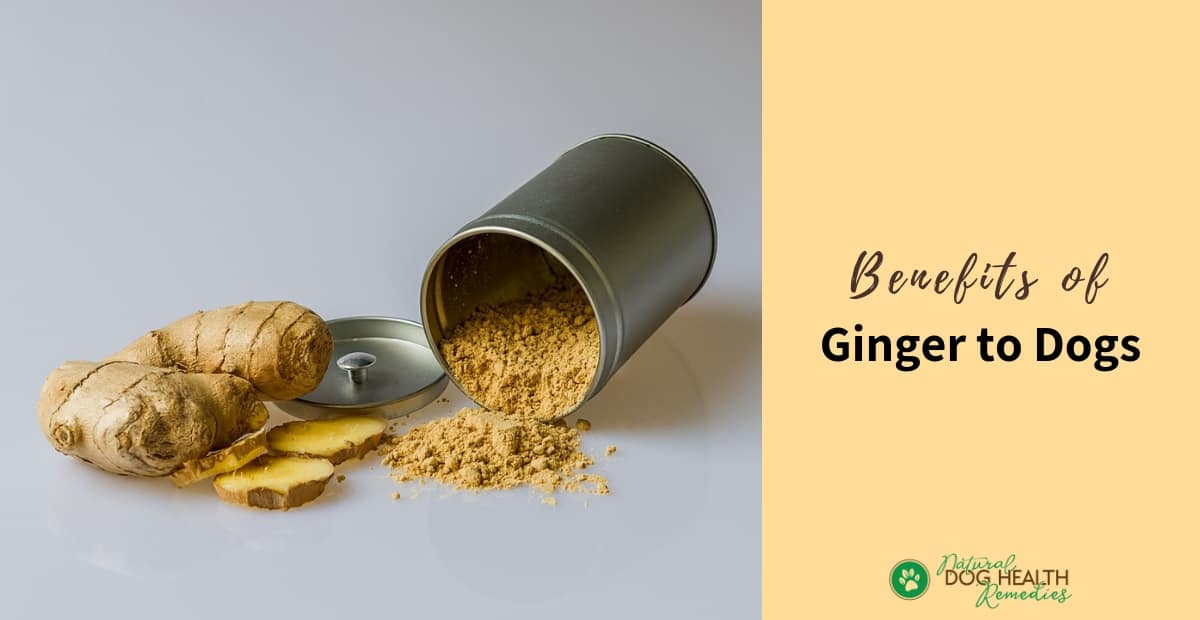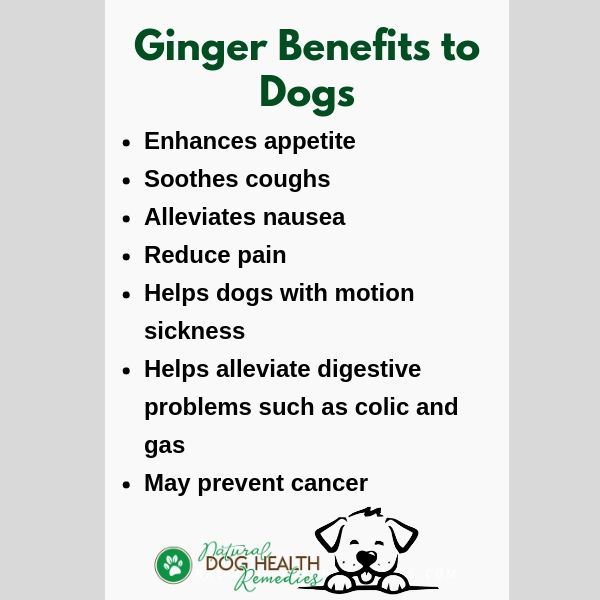Ginger Benefits for Dogs

Ginger Facts
Ginger root, a common herb used in Asian cooking, contains at least 477 chemicals, including essential oils, beta-carotene, acetic acid, alpha-linolenic acid, ascorbic acid, camphor, capsaicin, and gingerols.
Ginger is a catalyst herb - it is often added in small doses to many herbal teas and tinctures.
Because of its stimulating properties, ginger is used to revive and enhance the function of various organ systems.
Topically, it is used to stimulate blood flow and heat in the treated area. It increases circulation and sweating.
Is Ginger Good for Dogs?
Ginger is considered a safe herb for dogs to use, both topically and internally.
Fresh ginger root can be rather hot though, so some dogs may not like the taste, at least at the beginning!
If you want to give ginger roots to your dog, be sure to peel the ginger first. I like to grate the peeled ginger and mix it in with my dog's food. It's easier for dogs to eat and less likely to be picked out from the food.
Depending on the size of your dog, mix half a teaspoon to 1 teaspoon of grated fresh ginger with your dog's food and see how your dog likes it.
As ginger has blood thinning properties, it should not be given to pregnant or lactating dogs.
Common Uses in Dogs
Internal Use
Taken internally, the fresh root is sweat inducing and is therefore an excellent herb to dispel toxins through sweat.
It is beneficial for dogs that are in poor health. Specifically, ginger benefits dogs who have poor appetite, poor blood circulation, and a deep and slow pulse.
The fresh root's antispasmodic property makes it a good herb for coughs, nausea, stomach pain, and lower back pain.
If your dog suffers from motion sickness, ginger can be used to treat the problem (see below) by working as an anti-vomiting and anti-nausea agent.
The dried root can alleviate digestive problems, such as diarrhea, colic, and flatulence.
In addition, dried ginger root can be used as an herbal antioxidant and a tonic to enhance digestive health. It is especially beneficial to older dogs whose digestive systems are a bit sluggish. Just sprinkle some ginger powder on the dog's food.
Ginger may have anti-cancerous properties. In a study conducted in Malaysia, it was found that ginger could effectively block the promotion of cancerous tumors.
Topical Use
Used topically, ginger can be made into a poultice for the treatment of muscle pains and strains.
Instead of using fresh ginger roots, you can also use the essential oil of ginger. For example, use ginger oil in a blend together with peppermint, lemon, and lavender oils to make an arthritis massage oil blend.
Or, if your dog has tummy issues (e.g. colic), ginger essential oil together with Roman chamomile oil can be made into a soothing oil blend to rub on the dog's tummy.


Making a Ginger Glycerite
This versatile ginger glycerite can be used for different purposes. Used internally, it can prevent motion sickness or nausea, enhance digestion, and treat coughs. Used topically, it can be applied to minor burns and scalds after the skin has been cooled with cold water.
Here is how to make it:
- Loosely fill a jar with chopped fresh ginger root.
- Fill the jar to the top with vegetable glycerine.
- Seal the jar and leave it in a warm room for at least 6 weeks, shaking it every few days.
If your dog has motion sickness, give this glycerite to her about 20 minutes before getting on the car, preferably on an empty stomach.
Recommended dosage is 1/2 teaspoon per 20 pounds of body weight.
J.A. Duke, The Green Pharmacy Herbal Handbook: Your Comprehensive Reference to the Best Herbs for Healing (Rodale Books, 2000).
C.J. Puotinen, Natural Remedies for Dogs and Cats (Keats Publishing, 1999).
R. Kidd, Dr. Kidd's Guide to Herbal Dog Care (Storey Publishing, 2000).
M.L. Wulff-Tilford and G.L. Tilford, Herbs for Pets (Bowtie Press, 1999).





